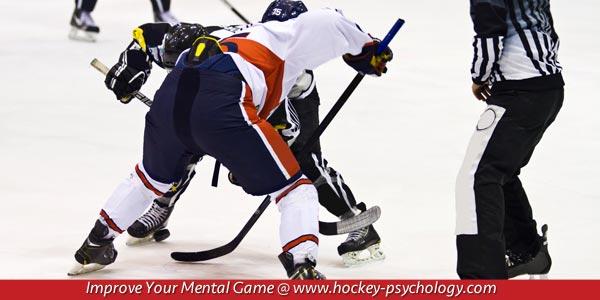How to Keep Self-Confidence High in Hockey
Self-confidence in hockey is the number one asset when discussing your mental game.
Self-confidence separates great athletes from the good athletes. Self-confidence is how much you believe in your ability.
Many hockey players have fragile self-confidence, or lose confidence easily after mistakes.
I recently received the following question from a young hockey player:
“I have been the leading goal scorer on my team for the entire season thus far. But for the last 7-8 games, confidence and self-doubt has been my key to failing. Part of it has also been me setting extremely high expectations for myself, but I have been doing that my whole life. The last few games, my coach downgraded my minutes because I have lacked production. I am also not sure if it’s how I prepare for games because I always sit in the locker room about 15 minutes. before the game and get focused, but I am just not sure how to get all of my self confidence back and it is always frustrating me, so if you could please help.”
The Two Most Common Self-Confidence Blunders are High Expectations and Self-Doubt
High expectations are demands you place on your performance that if you fail to achieve, you lose confidence in your game.
You might have expectations to be the lead scorer or assists, for example. Expectations are usually set so high it’s hard for even top NHL players to reach them!
When you fail to reach your expectations, you might assume you have failed in hockey at some level.
Instead of having high expectations for yourself, you’ll want to set smaller, mini or process goals. Process goals are the little things you need to do to perform well.
Some examples of process goals might include playing one shift at a time, track the puck well, and letting go of mistakes quickly.
Doubt is another confidence killer.
Doubt is the Opposite of Confidence
Hockey players might doubt their ability to performance under pressure during power plays for example. First, you must be aware when you have doubts.
They can be subtle or direct doubts. When doubts enter in your mind, such as “why is coach playing me less?” you want to refute them quickly.
We call this reframing doubts in sports psychology, such as “I can make the most out of each shift I play.”
Before games you’ll want to take control of your confidence.
One way is to review the reasons why you should feel confident.
Think about your strengths as a hockey player or what you’ve accomplished in hockey.
You can also think about drawing confidence from your practice and preparation, having good equipment, or support from parents and coaches.
The bottom line, you want to be proactive with your hockey confidence.
Choose to be confident before each game.
If you find yourself doubting or questioning your ability or playing time, think about your strengths as a player and practice positive self-talk.
Related Articles on Hockey Mental Game:
- How Confidence Boosts Performance
- Making Comparisons Hurts Hockey Confidence
- Do You Have Fragile Hockey Confidence?
*Subscribe to The Sports Psychology Podcast on iTunes
*Subscribe to The Sports Psychology Podcast on Spotify
The Mental Edge for Hockey

The Mental Edge for Hockey teaches you proven and simple mental game strategies so you can overcome fear of failure, lack of confidence, slumps or poor composure, take your practice game to competition, and boost your confidence in hockey. You learn simple, actionable mental game strategies to help you perform at your peak!
I’ve worked with athletes for 30 plus years – and know the top challenges that undermine performance when you perform in games. Now you can tap into my expertise and experience in coaching hockey players on the mental game.
In this program, you’ll learn the TOP 10 mental training lessons for hockey players – the same strategies I teach one-on-one athletes I coach on the mental game. My clients pay thousands of dollars for personal coaching, but now you can have the same strategies to improve your mental game – at a fraction of the price.

Leave a Reply